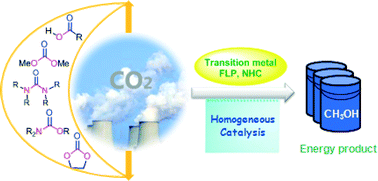Homogeneous hydrogenation of carbon dioxide to methanol
Abstract
Carbon dioxide, a greenhouse gas mainly from the consumption of fossil fuel, is regarded as an attractive feedstock in view of synthetic chemistry. Great efforts have been devoted to developing catalytic processes for converting CO2 into value-added compounds with reduced carbon footprint. Among versatile applications in organic synthesis, CO2 can serve as a promising raw material for fuel production, especially methanol. ‘Coming from fuel and returning to fuel’ is an appealing objective in terms of sustainable development associated with circumventing the energy shortage and CO2 issue. To date, metal complexes and organocatalysts for CO2 hydrogenation to methanol have been developed along with the reaction mechanistic insight. Understanding the interaction of active catalytic species with CO2 or hydrogen could account for development of efficient homogeneous catalysts. In this context, homogeneous catalytic hydrogenation of CO2 and its derivatives into methanol is highlighted in this article in combination with mechanistic understanding on a molecular level.

- This article is part of the themed collection: Carbon dioxide conversion

 Please wait while we load your content...
Please wait while we load your content...